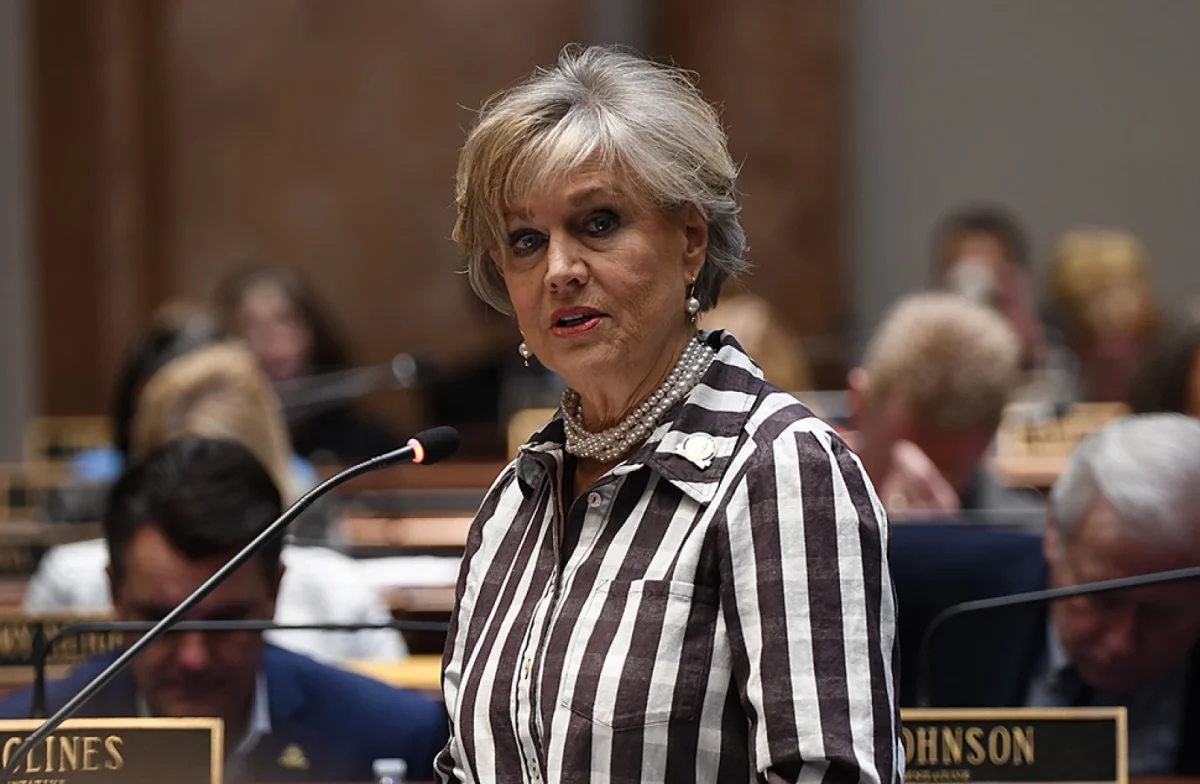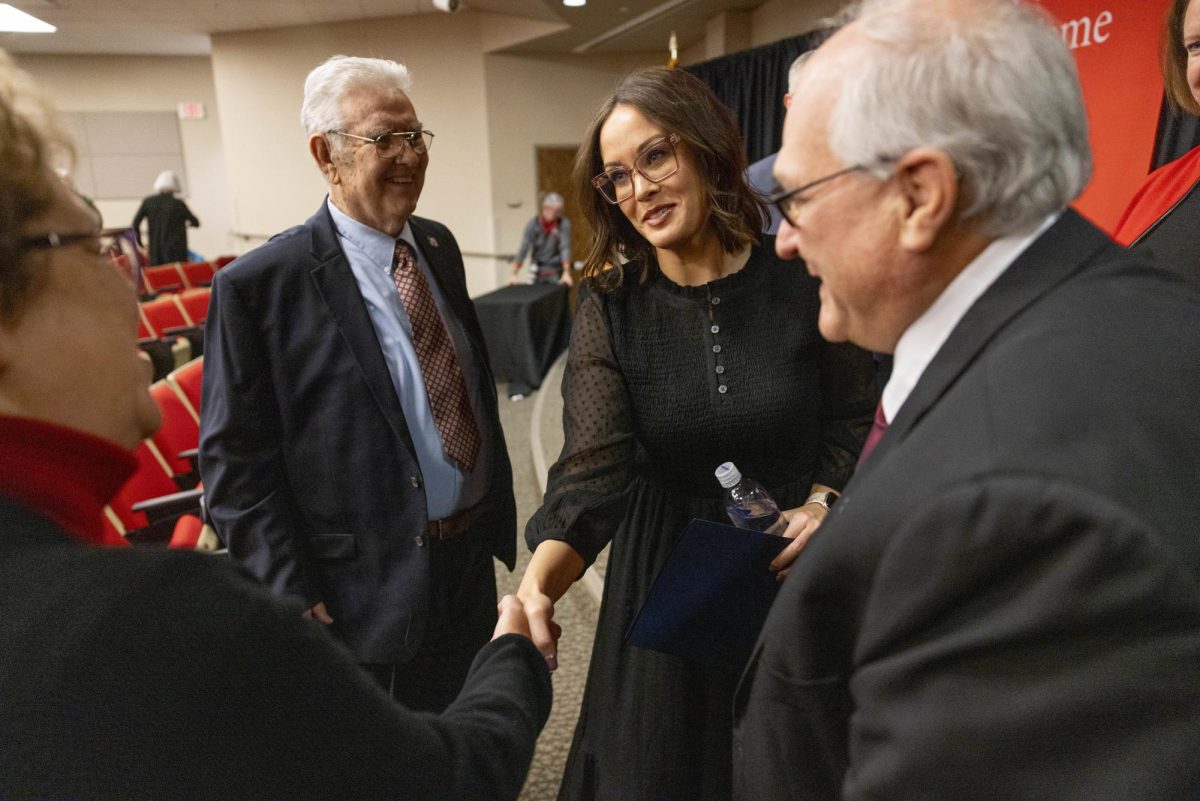Editor’s note: This story was originally published by the Kentucky Lantern on Thursday, March 14. Senate Bill 6, introduced in January, presented for the removal of “discriminatory concepts” at Kentucky public universities. At a specially called committee meeting on March 14 announced 24 hours prior, Rep. Jennifer Decker presented a substitute for SB 6 that would end all Diversity, Equity and Inclusion offices and programs and vastly expands the bill’s original restrictions.
FRANKFORT —The House Education Committee on Thursday overhauled and expanded Senate-approved restrictions on diversity programs without hearing from the bill’s Senate sponsor.
Rep. Jennifer Decker, R-Waddy, presented a substitute for Senate Bill 6 that goes much further than the version approved by the Senate and sponsored by Senate Republican Whip Mike Wilson.
Decker’s substitute would end diversity, equity and inclusion offices and programs at public universities in Kentucky.
Thirteen Republicans on the committee voted for SB 6 Thursday evening while three Democrats voted no. Republican Reps. Kevin Jackson and Scott Lewis passed.
Ordinarily, the bill’s primary sponsor would have presented the bill to the House committee, but Wilson was not there.
Jackson — who, like Wilson, is a Republican from Bowling Green — told the committee that he had concerns after speaking with Wilson earlier in the day
“I think you both think that you’re right, and you’re passionate about what you’re doing, and I think probably there could be a little compromise somewhere in the middle, but after talking to Sen. Wilson this morning, he didn’t know what had happened to his Senate Bill 6,” Jackson said, adding he wanted further information about the situation.
The bill that Decker presented to the committee has been overhauled to include language from her House Bill 9 barring universities and colleges from expending resources to support DEI programs or DEI officers. Her original bill has not received a committee hearing.
A Senate GOP spokesperson did not return an email request for comment about Wilson’s opinion of the current version. According to the Lexington Herald-Leader, Wilson had a “scheduling conflict” during the meeting. Wilson is a member of the Senate Education Committee, which was meeting at the same time, although that meeting was much shorter.
Decker told the Kentucky Lantern she met with Wilson before filing her legislation but hadn’t “talked to him since then.”
“I have no role to play in the decision of what the bills are when they come to the House,” she said. “I’m not in leadership.”
Before the initial bill passed the Senate on a party line vote, Wilson said his SB 6 aims to protect “diversity of thought” in higher education. He said he’s seen a trend excluding conservatives from employment or promotion as scholars if they do not conform to “liberal ideologies.”
The 32-page committee substitute says public universities shall not “provide any differential treatment or benefits to an individual, including a candidate or applicant for employment, promotion, contract, contract renewal, or admission, on the basis of the individual’s religion, race, sex, color, or national origin.”
What the committee heard
In her opening remarks, Decker said her version of the bill directs public institutions to give students “high quality academic instruction in an environment that is inclusive and welcoming to all.”
“They shall no longer provide any differential treatment or benefits to an individual on the basis of the individual’s religion, race, sex, color, or national origin — protected classes,” she said while explaining the bill. “They shall no longer manipulate or influence the composition of the student body based on protected classes. They shall no longer impose any scholarship criteria or eligibility restrictions based on protected class.”
Representatives of the Heritage Foundation and Manhattan Institute, conservative think tanks, spoke in favor of Decker’s proposal. So did Kentucky Students Right Coalition Executive Director Michael Frazier and University of Kentucky student Gavin Cooper.
Cooper said that as a “gay Democrat from West Virginia,” he does not agree on much with Decker, but he is supportive of SB 6. He criticized UK for spending money on DEI employees and initiatives rather than scholarships for low-income students.
“Academic freedom and inquiry are a cornerstone tradition on universities across this country, and if you truly believe that universities should be places of debate and true learning, you will support any attempt to clear the way for such practices,” Cooper said.
About a dozen opponents spoke against the bill, including Travis Powell, vice president and general counsel for the Kentucky Council on Postsecondary Education. The organization coordinates public higher education across the commonwealth. He warned that Kentucky cannot “afford to leave anybody behind at any of our campuses,” but vowed CPE would continue to help students be successful, even if resources are limited by the legislation.
He said the bill’s prohibition on promoting or providing “differential treatment to individuals based on the differences that we know that they have” would “severely limit us in being able to do the things we need in order to help them be successful.”
Felicia Nu’Man, the director of policy for the Louisville Urban League, said the group opposes the bill because it would “clawback all the progress we’ve made here in the commonwealth.” She recalled stories she heard from her mother, who was born in the 1950s, about segregation she experienced.
“These things are important. They are the legacy of my family, and I’m a Kentuckian. These stories need to be told, and these stories need to be talked about. These stories also are a part of the legacy of the entire United States.
As amended, SB 6 would require university governing boards to adopt “viewpoint neutrality” policies by June 30 that prohibit “discrimination on the basis of an individual’s political or social viewpoint” and promote “intellectual diversity within the institution.” The policies would have to be published online and in the student and faculty handbooks.
During questions, Rep. Josie Raymond, D-Louisville, asked Decker if Nazism would be protected on college campuses under such “viewpoint neutrality” policies.
“There should be adopted a policy that would promote and enforce viewpoint neutrality,” Decker said, adding that Nazism is a discriminatory concept if it’s “offered without debate as true.”
Where did ‘DEI’ criticism come from?
Kentucky’s anti-DEI legislation follows a nationwide trend as conservatives lead rolling back such measures, particularly in higher education. Earlier this month, the University of Florida closed its DEI offices, eliminated DEI positions and administrative positions and stopped DEI contracts with outside vendors after the state board of education prohibited universities from spending money on DEI programs. Tennessee passed a law last year that would allow students and employees to file reports against schools for allowing “divisive concepts” to be taught.
The movement gained traction following the U.S. Supreme Court’s 2023 decision to end affirmative action in higher education. Ahead of Thursday’s meeting, Republican Attorney General Russell Coleman’s office released an opinion that found the Council on Postsecondary Education’s definition of “underrepresented minority” using “race-exclusive terms” violated the U.S. Constitution and the Civil Rights Act. Decker requested the opinion. It cites the Supreme Court decision.
“Equality will not arise out of inequality,” the opinion said. “Kentucky public postsecondary institutions will not achieve equality by being forced to treat students of different races differently.”
A February poll released by the Foundation for a Healthy Kentucky found that 71% of registered Kentucky voters believe businesses and institutions should be allowed to make decisions regarding their DEI education and training programs without government interference. Mason-Dixon Polling & Strategy conducted the poll, which surveyed 625 voters.
Since the introduction of Kentucky’s legislation, a panel of Black scholars argued DEI initiatives offer protections for historically marginalized groups, such as those in poverty, women, members of the LBGTQ+ community, people of color and more.
Last month, University of Kentucky President Eli Capilouto and University of Louisville President Kim Schatzel both affirmed their support for DEI initiatives at those universities in letters to campus.
Democratic Gov. Andy Beshear has also vocally supported DEI, saying “diversity is an asset” and makes Kentucky “more welcoming” to companies that might relocate to the state.
This story is attributed to the Kentucky Lantern. To read more, visit their website at https://kentuckylantern.com/.









![Samuel Towe (right) finds time to play next to his mother Laura Towe before the Americans for Prosperity “Yes On 2” rally at the La Gala event center in downtown Bowling Green, on Monday, Oct. 28, 2024. “I’m fortunate to be able to choose [schools]. I want other families who may not have the means to be able to choose as well,” Laura Towe said.](https://wkuherald.com/wp-content/uploads/2024/10/amendtwo_4-1200x800.jpg)

